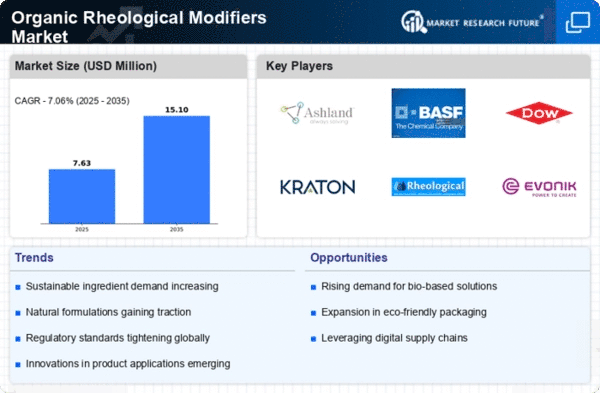Market Share
Organic Rheological Modifiers Market Share Analysis
The Organic Rheological Modifiers market uses several strategies to position itself and increase market share. To differentiate organic rheological modifiers from competitors, corporations use product differentiation. This may involve producing custom formulations, improving chemical compositions, or making application-specific goods. Companies emphasize these traits to attract clients seeking higher performance or specific attributes and increase market share.
Organic Rheological Modifiers' market placement depends on pricing. Companies may provide competitive pricing to attract cost-conscious customers and expand their market share. However, a premium pricing approach might represent the product as high-quality or fulfilling strict industry standards, enticing customers prepared to pay extra for perceived value. To position a brand and achieve market share, price and value must be balanced.
Organic Rheological Modifiers' market share depends on distribution channels. Strong partnerships with distributors, wholesalers, and manufacturers ensure product availability. This accessibility helps buyers find Organic Rheological Modifiers, increasing market share. Companies can also use digital platforms and internet channels to reach more customers than traditional distribution techniques.
Brand recognition and targeted marketing efforts are key to Organic Rheological Modifiers market share positioning. A strong brand image and favorable product associations can greatly impact client preferences. Companies use industry-specific advertising, trade exhibitions, and internet promotions to increase brand awareness and market share.
The dynamic Organic Rheological Modifiers market requires innovation and adaptation. Offering cutting-edge solutions can help companies lead in technology and industry. Improvements and eco-friendly formulations make a product more competitive and attract clients looking for responsible and innovative items.
Organic Rheological Modifiers market share positioning also depends on collaboration and strategic collaborations. Partnering with suppliers, research institutions, and other industry participants can boost product quality, streamline manufacturing, and boost market share. These partnerships strengthen Organic Rheological Modifiers market position.
Organic Rheological Modifier market share positioning depends on global and regional factors. Understanding regional wants and preferences helps organizations customize their strategy to specific markets, making them more targeted and effective."


















Leave a Comment